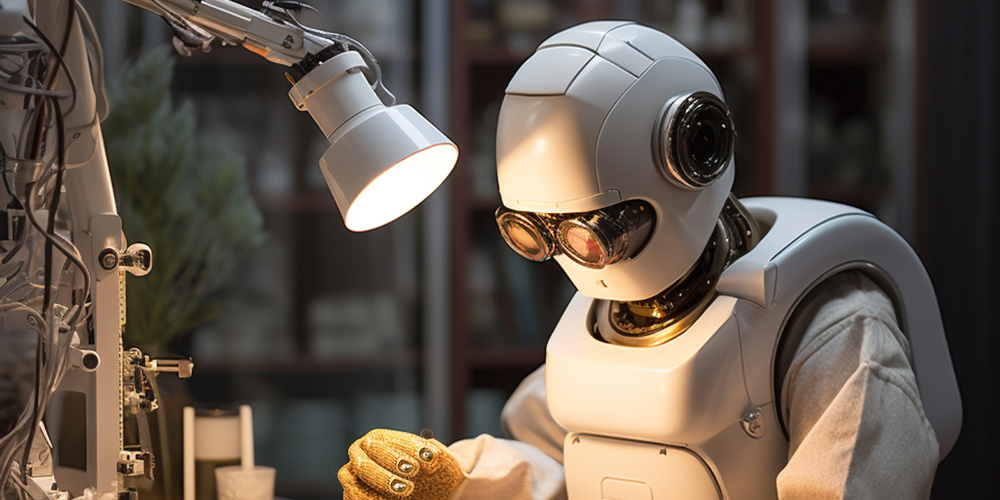The Future of AI: Transforming Industries and Everyday Life
Artificial Intelligence (AI) is no longer just a futuristic concept; it is now a fundamental part of our daily lives. From personal assistants to complex algorithms that drive business decisions, AI is shaping the future in ways we are only beginning to understand. This article explores how AI is transforming various industries and the implications for everyday life.
Understanding AI: What It Is and How It Works
At its core, Artificial Intelligence refers to the simulation of human intelligence in machines. These systems are designed to think, learn, and problem-solve. AI can process vast amounts of data quickly and accurately, making it invaluable in numerous fields.
Types of AI
There are primarily two types of AI: narrow and general. Narrow AI is designed for specific tasks, like voice recognition or image processing. General AI, however, is still theoretical and would perform any intellectual task a human can do.

The Role of Machine Learning
Machine Learning (ML) is a subset of AI that focuses on the development of algorithms that allow computers to learn from data. ML is behind many modern applications, including recommendation systems and fraud detection.
Transforming Industries
Healthcare
In the healthcare sector, AI is revolutionizing patient care and medical research. From diagnosing diseases using imaging data to predicting patient outcomes, AI tools are enhancing the efficiency and accuracy of healthcare services. For example, AI-driven diagnostic tools can analyze medical images faster than human radiologists, reducing wait times for patients.
Improving Patient Outcomes
AI also helps in personalizing treatment plans. By analyzing individual patient data, AI systems can recommend tailored therapies that improve outcomes. This personalization is leading to higher recovery rates and better overall health.
Finance
The finance industry is experiencing significant changes due to AI technologies. Banks and financial institutions are using AI for fraud detection, risk management, and customer service. AI algorithms can identify unusual patterns in transaction data, alerting institutions to potential fraud much quicker than traditional methods.
Enhancing Customer Experience
Chatbots powered by AI are becoming common in customer service, providing instant responses and solutions to client inquiries. This enhancement in service leads to increased customer satisfaction and loyalty.
Retail
In retail, AI is changing how consumers shop and businesses operate. Companies are leveraging AI for inventory management, sales forecasting, and personalized marketing strategies. AI algorithms analyze shopping patterns and customer preferences, enabling businesses to target their marketing efforts more effectively.
Personalized Shopping Experiences
AI-driven recommendation systems enhance the shopping experience by suggesting products based on previous purchases. This personalization leads to higher conversion rates and increased sales.
The Impact on Everyday Life
Smart Homes
AI is also making its way into our homes. Smart devices, such as voice-activated assistants, can control everything from lighting to heating. These AI systems learn user preferences over time, creating a more personalized living environment.
Convenience and Efficiency
The convenience of smart home technology enhances daily life. Tasks that once required manual effort can now be automated, saving time and energy.
Transportation
AI is transforming the transportation industry through advancements in autonomous vehicles. Self-driving cars use AI algorithms to navigate safely and efficiently, potentially reducing accidents caused by human error.
Reducing Traffic Congestion
AI technology can also optimize traffic flow in cities, leading to reduced congestion and shorter travel times. This optimization can make commuting more pleasant and less stressful.
The Ethical Considerations
As AI continues to evolve, ethical considerations come into play. Issues such as privacy, job displacement, and decision-making biases need careful examination. It is crucial to establish guidelines that ensure AI technologies are used responsibly and fairly.

Privacy Concerns
Data privacy is a significant concern in an AI-driven world. With AI systems collecting vast amounts of personal data, maintaining user privacy is essential. Striking a balance between data utilization and privacy protection is vital for building public trust.
Job Displacement
Another pressing issue is the potential for job displacement. As AI automates routine tasks, some jobs may become obsolete. However, it is also important to recognize that AI will create new roles and opportunities in various fields.
Conclusion: Embracing the Future
The future of AI is bright, filled with opportunities for innovation and improvement across multiple industries. While challenges exist, the potential benefits far outweigh the drawbacks. By embracing AI responsibly, we can enhance our lives and redefine how industries operate. As we move forward, staying informed about these changes will be crucial for navigating the evolving landscape of technology.


